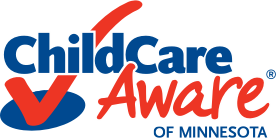Supporting Family, Friend, and Neighbor (FFN) Care Providers

When licensed child care options are not being used due to cost, availability, or family preference, many Minnesota parents turn to informal care by “family, friends, and neighbors” – often grandparents. A new article from the Minneapolis Federal Reserve Bank highlights this issue in our region, discusses findings from a recent survey, and emphasizes the importance of this care for many families.
The article notes that FFN care is especially prevalent in rural areas and lower-income urban neighborhoods. While FFN care can offer benefits such as building on existing relationships, flexibility, and availability outside of standard working hours, those providing that care have less formal training and support, and often make financial sacrifices such as retiring or reducing their own work hours in order to provide this care.

We know that gaps in affordable, accessible licensed child care are especially acute in certain geographies (rural, low-income) and for certain age groups (infants/toddlers). The child-care ecosystem is bigger than just formal licensed centers and programs: informal care plays a crucial role. This means that policymakers should recognize and support FFN providers as part of the solution to child-care access. Creating additional support, training, and resources for FFN providers could help improve the quality and reliability of the child care that families depend on.
The full article is available on the Minneapolis Federal Reserve website.
